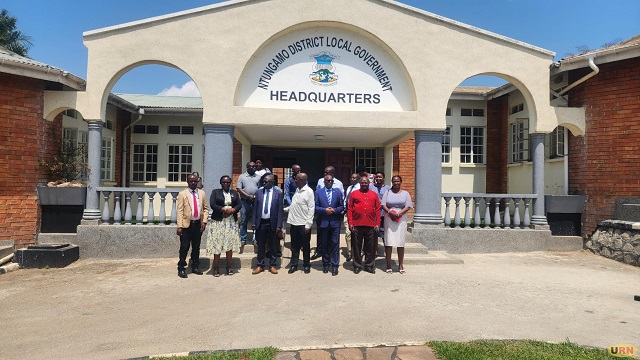
Ntungamo, Uganda | THE INDEPENDENT | Fred Bahati, the Acting Ntungamo District Education Officer, has urged the establishment of clearly defined roles for foundation bodies in grant-aided schools to mitigate ongoing conflicts.
Bahati said that currently there is an ambiguity in the roles of these bodies that often leads to misunderstandings and disputes, as some foundation bodies act as though they have control over the schools akin to private institutions.
The education officer made the remarks while submitting his proposals to the Nuwe-Amanya Mushega-led Education Policy Review Commission, which visited the Ankole and Kigezi regions to gather stakeholders’ opinions on how to improve the country’s struggling education sector.
The Acting District Education Officer emphasized that delineating these roles and boundaries is crucial to ensuring smooth operations and resolving tensions within the educational framework.
He said that the various foundation bodies, including faith-based organizations like the Catholic Church, Church of Uganda, Seventh Day Adventists’ church, Uganda Muslim Supreme Council, and others, appear to be unclear about their limits and roles.
“Some even engage directly in the day-to-day management of schools. setting fees and charges to be collected, using school fees in ways that disregard the PTA and SMC, while others are interfering with decisions about which teachers and headteachers should be assigned to specific schools,” he said.
For many years before independence, most schools were privately run by foundation bodies, primarily religious institutions. However, the 1963 Act nationalized these schools, making them public to address issues such as discrimination in admission. When the NRM government came to power, the schools were returned to the foundation bodies.
According to the Education Act, the schools are now jointly managed by the foundation bodies and the government, with the latter continuing to offer essential grants. The said schools these schools have to receive statutory grants from the government to help with their operation and management.
This support includes funding for infrastructure development, providing educational materials, and paying staff. Bahati notes that, given the changes in the sector and the increasing involvement of foundation bodies, there is a need to revisit laws and policies to clearly define their roles.
He adds that frequently the central government and education officers in local government are rendered powerless in the face of these foundation bodies. For example, he points out that while the law stipulates that education authorities must consult with foundation bodies when appointing headteachers and posting staff, many foundation bodies often assume authority and insist that the authorities appoint their preferred candidates, even if they are not qualified.
The issue highlighted by the education officer has increasingly become a national crisis, with districts and the Ministry of Education often locked in conflicts over headteacher appointments, frequently clashing with foundation bodies.
For instance, in 2022, a significant dispute arose between the Kampala Archdiocese and the Ministry of Education and Sports regarding the appointment of the next headteacher for St. Mary’s College Kisubi (SMACK).
The ministry had proposed Brother Augustine Mugabo, the current headteacher of St. Henry College-Kitovu, also under the Brothers of Christian Instruction, as the ideal candidate for the prestigious 116-year-old school. However, the archdiocese rejected Mugabo’s appointment.
The issue was only resolved after lengthy negotiations between the church and the ministry, concluding in March 2023.
Status of secondary education
In a related development, the DEO has urged the commission to address the issue of partial decentralization in secondary education, which he believes is impacting the sector. He pointed out that local governments often show little interest in education, while the ministry may not have the reach to effectively manage all areas.
Currently, secondary teachers are recruited, posted, and transferred by the central government, while their salaries are paid by local governments. Additionally, many functions related to secondary education are vested in the Ministry of Education, with only a few delegated to the districts.
Bahati said that this arrangement is problematic, as it is difficult to manage and evaluate individuals who are not directly under one’s supervision. He also noted that teachers are sometimes transferred to different districts without informing the local governments where they previously worked, leading to issues such as teachers drawing double salaries or being dropped from payrolls.
The DEO thus recommended that the commission examine this situation and consider either centralizing or fully decentralizing these functions, rather than maintaining the current partial approach.
*****
URN
 The Independent Uganda: You get the Truth we Pay the Price
The Independent Uganda: You get the Truth we Pay the Price





